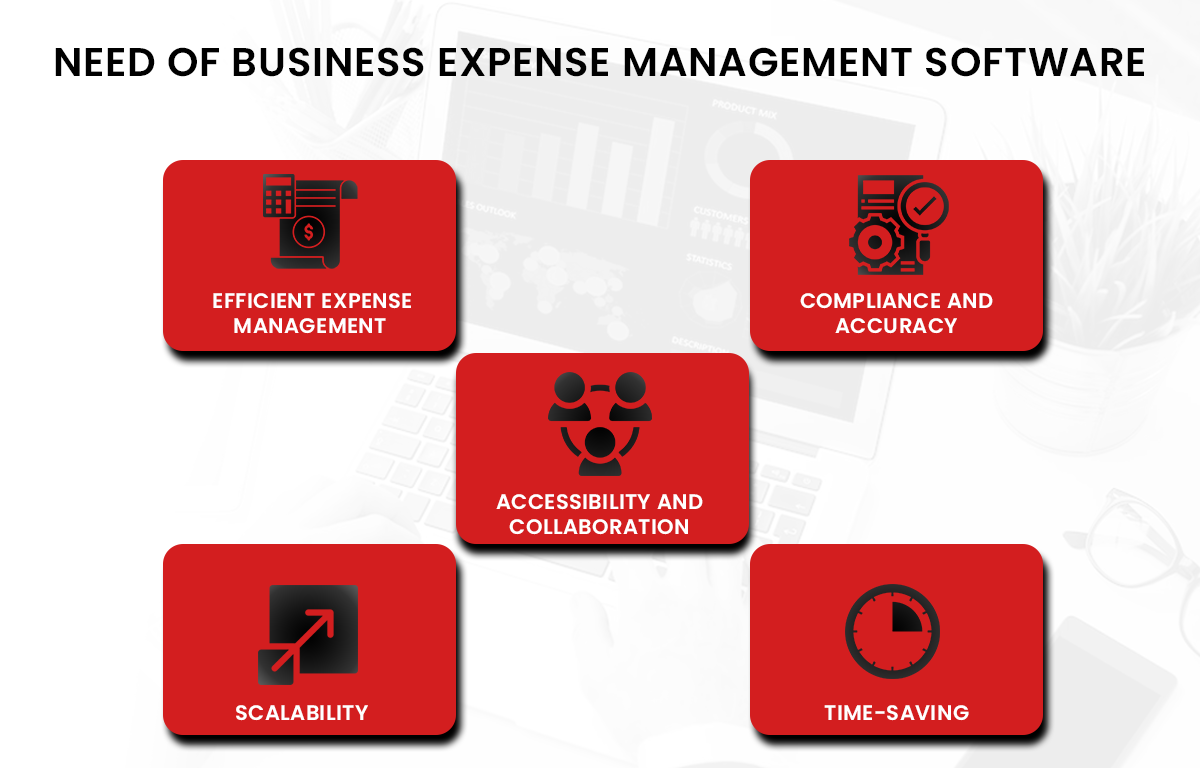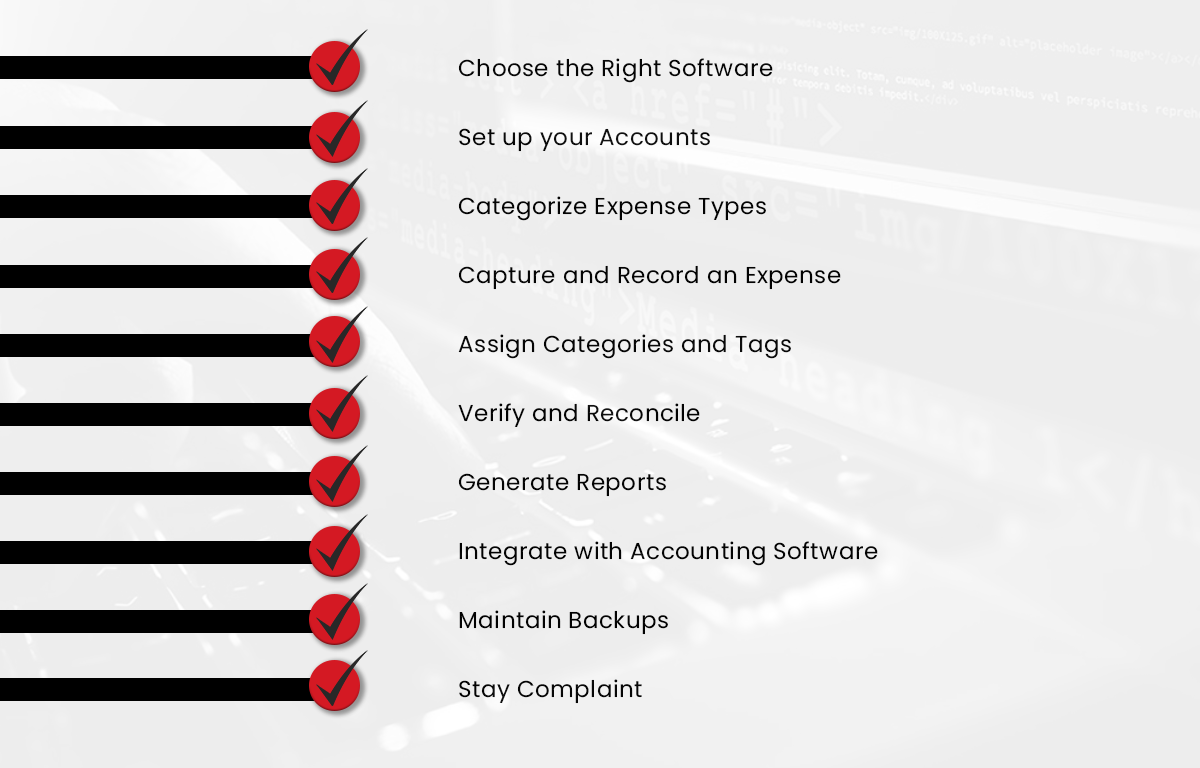If we look at the survey conducted by Certify, businesses using expense management software experienced an average of 25% reduction in their expense processing costs.
Also, expense management software for small business has proven to be a time-saving solution. A Global Business Travel Association study found that organizations and businesses using automated expense management tools could process expense reports up to 3.5 times faster than those using manual methods.
The use of expense tracking software has shown accuracy improvements. The Aberdeen Group reported that companies using such software experienced a 33% decrease in mistakes and inaccuracies in their expense reports.
By adopting expense management software, businesses gain better control over their finances, reduce processing costs, save time, and improve accuracy in expense reporting. This ultimately contributes to the growth and success of the business, allowing entrepreneurs to focus on nurturing and expanding their ventures.
The situation has completely changed with the advent of business expense tracking software. Scrolling down this blog, you will uncover everything about business expenses software and how it can help your business to manage your financial affairs.
Join us as we will explore the main characteristics and advantages of Business expense management software, examine the finest solutions on the market, and aid you with helpful advice on how to select the best option for your company. Additionally, we will provide you with professional guidance to solve them.
What is Business Expense Tracking Software?
Expense tracking software offers benefits that can turn growth upside down. It automates the expense tracking process that automatically reduces manual data entry, saving time and lessening human mistakes. Research shows that using software to track business expenses can save up to 70% of the time typically spent on expense reporting.
In addition to time savings, these tools provide better accuracy in monitoring expenses. According to a survey, several businesses experienced 19% of expense reports containing errors, leading to financial discrepancies. Expense tracking software minimizes errors by automatically capturing and categorizing expenses, reducing the risk of errors.
Furthermore, the best expense management tools offer real-time insights and reporting capabilities. Small business owners can access detailed expense reports, analyze spending patterns, and identify cost-saving opportunities. According to a survey, it has also been noted that businesses using expense management software experienced a 26% reduction in travel and entertainment expenses.
Overall, small business expense tracking software empowers organizations to funnel expense management processes, reduce errors, and gain better financial visibility. It enables informed decision-making, improves cost control, and contributes to overall business success. As a result, maximum small businesses are adopting expense management software to optimize their financial operations and maximize profitability.
Importance of Expense Management for a Small Business
Expense management is an essential aspect of the success and sustainability of small businesses. Careful monitoring and control of expenses are the essentialities that will help you to maintain financial stability and maximize profitability. By understanding and managing expenses effectively, small businesses can optimize their cash flow, allocate resources efficiently, and make informed financial decisions.
Proper expense management allows businesses to check on cost-saving opportunities, reduce unnecessary expenditures, and improve operational efficiency. It also allows you to evaluate various business activities' return on investment (ROI), make strategic adjustments, and prioritize necessary expenses. Moreover, effective expense management helps in maintaining a balance between revenue generation and expenditure, ensuring long-term viability and growth.
By using the best expense management tools, budgeting tools, and financial analysis, small businesses can gain better visibility into their financial health, identify areas of improvement, and make informed decisions about resource allocation. Ultimately, sound expense management empowers small businesses to operate more efficiently, remain competitive, and achieve their financial goals.
Why do Businesses Need Business Expense Management Software?

1. Efficient Expense Management
Business expense management software enables organizations to flawlessly manage their expenses. It provides a centralized platform to track and record all business expenses, including purchases, reimbursements, and invoices. This helps you to decide the right prospect of where to spend and where to control your hand.2. Cost Control
By using small business expense tracking software, you can gain better control over the costs. The software allows you to monitor and analyze expenses, identify areas of overspending or potential savings, and make informed decisions to optimize your budgets.3. Compliance and Accuracy
Business expense tracking software ensures compliance with financial regulations and reduces the risk of errors. It automates expense reporting, eliminating manual entry and reducing the chances of human error. This leads to more accurate financial records and simplifies tax reporting.4. Time-Saving
Manual expense tracking is time-consuming and prone to mistakes. Business expense management software unifies the process by automating tasks such as receipt scanning, data entry, and report generation. It helps you manage several other things and brings profitability to the work.5. Accessibility and Collaboration
Cloud-based expense tracking software enables businesses to access their expense data from anywhere at any time. It facilitates collaboration among team members, allowing them to submit expenses, review reports, and communicate seamlessly. That means you can easily keep an eye on your complete financial activities and act accordingly.6. Scalability
It serves businesses of all sizes through this software to keep track of business expenses and helps small businesses the most. It is particularly beneficial for small businesses, as it provides cost-effective solutions tailored to their needs. These tools are scalable and can accommodate the growing needs of the business as it expands.
Want to try tracking software for your business? Click Here
What are the Advantages of Expense Tracking System?
1. Streamlined Expense Tracking
With expense management software, businesses can easily track and record their expenses in a centralized system. This eliminates the need for manual processes and paperwork, making the entire process more efficient and accurate.2. Automation of Processes
Expense management software for small businesses automates various tasks, such as receipt scanning, data entry, and report generation. This automation needs no reason to explain how beneficial they are and how it can help you financially and growth-wise.3. Improved Accuracy
Manual expense tracking is prone to errors, whether through data entry mistakes or lost receipts. The benefits of the best expense management tools are vice versa by automating the process and ensuring that all expense data is accurately recorded.4. Better Compliance
Amalgamation with financial regulations and tax requirements is crucial for businesses. Expense management software for small businesses helps ensure this networking by providing detailed records of expenses, supporting documentation, and generating reports that can be easily audited.5. Cost Control and Budget Optimization
Business expense tracking software provides valuable insights into spending patterns and helps identify areas where costs need to be controlled and optimized. Analyzing expense data allows businesses to make informed decisions to reduce unnecessary expenditures and allocate resources more effectively.6. Real-time Visibility
Business expense tracking software offers real-time visibility into business expenses. This helps businesses to monitor their financial health and make timely adjustments as needed. Managers can quickly access expense reports and track spending trends to make sure that they stay within the budget.7. Increased Employee Productivity
Manual expense tracking is very time-consuming and frustrating for employees at times. But when you are in the habit of using expense tracking software, businesses can simplify the process for employees, allowing them to submit expenses more efficiently and focus on their core responsibilities.8. Enhanced Collaboration
Expense management software promotes collaboration among team members. It smoothens the process by empowering your employees to submit expenses, review reports, and communicate seamlessly within the system. This streamlines the approval process and facilitates effective communication regarding expenses.9. Scalability and Customization
Business expense tracking software is not just limited it a particular type of business but spreads the variety in the category. Whether it's a small startup or a large corporation, businesses can choose software solutions that align with their specific needs. The software can also be scaled as the business grows and requires additional features or capabilities.How Can You Track Your Business Expense Tracking Software?
Here is a small guide to help you understand how to use the best expense management tools or software:

Guide on How to Build Software to Keep Track of Business Expenses
1. Define Requirements
Clearly define the requirements and goals of your business expense tracking software. Consider factors such as expense categorization, receipt management, reporting capabilities, integration options, user interface, and scalability.2. Design the Database
Determine the structure of your database to store the data. Identify the necessary tables, fields, and relationships to capture and organize expense information effectively.3. Develop the User Interface
Design an intuitive and user-friendly interface that allows users to input and manage expenses. Include all features that you think are essential such as expense entry forms, receipt uploading, and search functionality.4. Implement Expense Categorization
Create a system for categorizing expenses based on your business needs. Allow users to assign categories or tags to each expense, enabling easy grouping and filtering.5. Receipt Management
Provide functionality for users to upload and store receipts associated with expenses. Consider implementing features like optical character recognition (OCR) to extract data from receipts automatically.6. Expense Entry and Editing
Develop forms or interfaces for users to enter expense details, including date, amount, vendor, and description. Enable users to edit or update expense information when necessary.7. Reporting and Analytics
Implement reporting features that allow users to generate expense reports based on specified criteria. Include options for filtering, sorting, and exporting reports in various formats.8. Integration Capabilities
Consider integrating your expense tracking software with other tools commonly used in business operations, such as accounting software or payment platforms. This integration will streamline data flow and eliminate the need for duplicate entries.9. User Access and Security
Implement user authentication and role-based access control to ensure data security and privacy. Different user roles can have varying levels of access and permissions within the software.10. Testing and Feedback
Thoroughly test the software to identify and fix any bugs or issues. Gather feedback from users during the testing phase to improve the user experience and address any usability concerns.11. Deployment and Maintenance
Once the software is tested and ready, deploy it to the desired environment, such as on-premises or in the cloud. Regularly update and maintain the software to address any future issues or feature enhancements.
Want to try tracking software for your business? Click Here
Conclusion
In conclusion, implementing business expense tracking software is essential for small-scale businesses to efficiently manage their expenses. By automating processes, categorizing expenses, and providing accurate records, this software helps save time, reduce errors, and improve financial decision-making.
Look for user-friendly and affordable solutions that offer features like expense categorization, receipt scanning, and integration with accounting systems. With the right expense-tracking software in place, small businesses can streamline their financial management and focus on growth and success.

.webp?lang=en-US&ext=.webp)

.webp?lang=en-US&ext=.webp)
